About IIT JAM Exam 2021
IIT JAM is popularly known as the Indian Institutes of Technology Joint Admission Test for Masters, which is a National-level entrance test conducted every year by one of the IITs on a rolling basis, to provide admission to the postgraduate M.Sc programs offered by different IITs. For IIT JAM 2021 exam, The Indian Institute of Science (IISc), Bangalore is the conducting body of the exam.
It is a computer-based online examination conducted in eight zones at different IITs across the country. The exam paper is divided into 3 sections consisting of the questions based on the paper codes selected by the candidates at the time of filling the application form. Candidates need to qualify the IIT JAM entrance exam to get selected in one of the IITs for pursuing the master's in science field course.
IIT JAM Exam 2021: Key Element
| ATTRIBUTES | DETAILS |
| Name | IIT JAM |
| Full-Form | Indian Institutes of Technology Joint Admission Test for Masters |
| Conducting Authority | One of the IITs on a rolling basis |
| Conducting Authority of IIT JAM 2021 | Indian Institute of Science, Bangalore |
| Number of IIT JAM Exam Per Year | 01 |
| Registration Mode | Online |
| Exam Mode | Online Computer Based Test (CBT) |
| Numbers of Questions | 60 |
| Exam Pattern | Multiple
Choice Questions (MCQs) Multiple Select Questions (MSQs) Numerical Answer Type (NAT) |
| Duration | 3 hours |
| Registration Fee |
One
Test Papers
|
| Language | English |
| Exam Website | https://jam.iisc.ac.in/ |
| IIT JAM Helpline (Organizing Institute) | 080-22932392 |
| jam@iisc.ac.in |
IIT JAM Exam Important Dates 2021
Candidates can check all the important dates such as application form, admit card, exam, and result of IIT JAM exam from the table mentioned below:
| PARTICULAR | DATE |
| IIT JAM Registration begins | September 10, 2020 (Thursday) |
| IIT JAM Registration closes | October 15, 2020 (Thursday) |
| IIT JAM Admit Card | January 11, 2021 (Monday) |
| Date of Examination | February 14, 2021 (Sunday ) |
| Announcement of Result | March 20, 2021 (Saturday) |
| Admission Application Form | April 15-28, 2021 |
| First Admission List | June 16, 2021 (Wednesday) |
| Second Admission List | July 01, 2021 (Thursday) |
| Third and Final Admission List | July 16, 2021 (Friday) |
| Admissions closes | July 20, 2021 (Tuesday) |
IIT JAM Examination Test Schedule 2021
| DATE | SESSION I | SESSION II |
| February 14, 2021 (Sunday) | 9:30
AM to 12:30 PM Biotechnology (BT), Mathematical Statistics (MS), and Physics (PH) | 3:00
PM to 6:00 PM Chemistry (CY), Economics (EN), Geology (GG), and Mathematics (MA) |
IIT JAM Exam Registration Process 2021
IIT JAM Exam 2021 registration process is an online process made available by the JAM Online Application Processing System (JOAPS). The registration commences on September 10, 2020 (Thursday), till October 15, 2020 (Thursday). Candidates who want to participate in the exam have to apply for the exam by filling the application form through the official website of the IIT JAM. It is an online process that involves the following steps:
Step 1: Registration
- Visit the official website of IIT JAM – Click Here
- Click on the JOAPS (JAM Online Application Processing System).
- Fill required details.
- Get yourself register by filling in all the details required in the registration form.
- Click submit.
- Get Password and Registration ID to login to the IIT JAM application form.
Step 2: Fill IIT JAM online application form 2021
- Re-login using unique IIT JAM Registration ID
- Click “Edit Application Form”.
- Enter details of no. of paper, paper subject, and exam city, etc.
- Fill in all the required personal details.
Step 4: Upload Documents
- Upload the scanned photograph (3.5 cm X 4.5 cm, 5kb to 200kb).
- Upload the scanned signature (2 cm X 7 cm, 5 KB to 100 KB).
Step 3: Fee Payment
- After clicking Save & Next, the fee payment page will be redirected.
- Choose payment mode (Net Banking, Credit card, and Debit Card).
- Click proceed to pay.
| Group/Category | One Test Paper | Two Test Papers |
| Female (All Categories)/SC/ST/PwD | 750 INR | 1050 INR |
| All Others | 1500 INR | 2100 INR |
Step 5: Final Submission
- After completing all the steps mentioned above candidates will have to do the final submission of the IIT JAM application form.
- Don’t forget to download the filled-in application form.
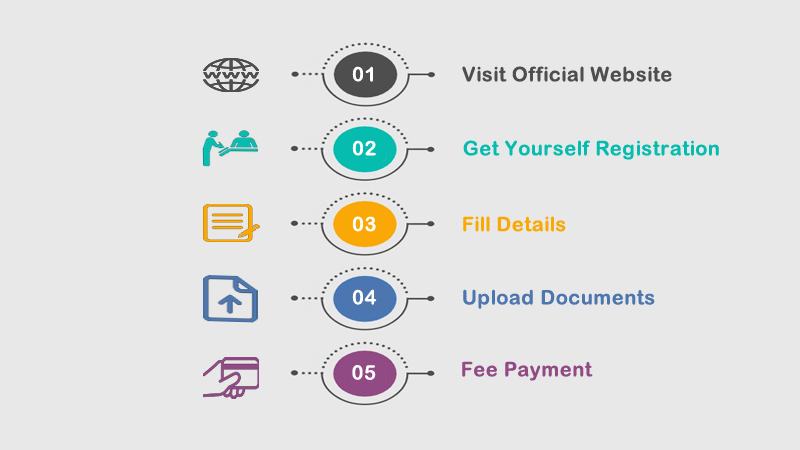
IIT JAM Exam Eligibility 2021
Candidates who want to join the IITs for the Master's program in the science field, need to take the common entrance exam conducted by one of the IITs on a rolling basis. Students have to fit the eligibility criteria of the IIT JAM 2021 issued by the exam conducting authority. Listed below are the eligibility criteria for the IIT JAM 2021 entrance exam:
- Candidates should possess a bachelor's degree in relevant discipline from a recognized university/institute with an aggregate of 55% or 5.5 marks or CGPA/CPI.
- Final year candidates can also apply, but their admission shall be subjected to the submission of the passing certificate of the final year, i.e., a minimum of 55% or 5.5 marks or CGPA/CPI. (by September 30, 2021)
- The Foreign nationals who possess an Indian degree are also eligible to apply based on the admitting institute’s policy.
- Reservation of 5% is provided to the SC/ST and PwD students for appearing in the entrance exam (50% or 5.0 are required by them to be eligible).
Note: If the candidate is found unqualified at the time of admission or that he/she submitted the false documents, then the Admitting Institute has the right to cancel the admission of that candidate.
IIT JAM Exam Paper Codes 2021
IIT JAM exam is conducted on the basis of seven subjects which comprises of different syllabus or topics for different courses. Students need to choose the subjects accordingly based on the course they are opted for. Listed below are the paper codes provided by the IITs for the JAM MSc exam 2021 with the subjects for which they are available:
| SUBJECT | PAPER CODE | SUBJECTS |
| Biotechnology | BT |
|
| Chemistry | CY |
|
| Economics | EN |
|
| Geology | GG |
|
| Mathematics | MA |
|
| Mathematical Statistics | MS |
|
| Physics | PH |
|
Given below is the list of courses offered by different IITs with paper codes issued by the conducting authority of IIT JAM Exam 2021:

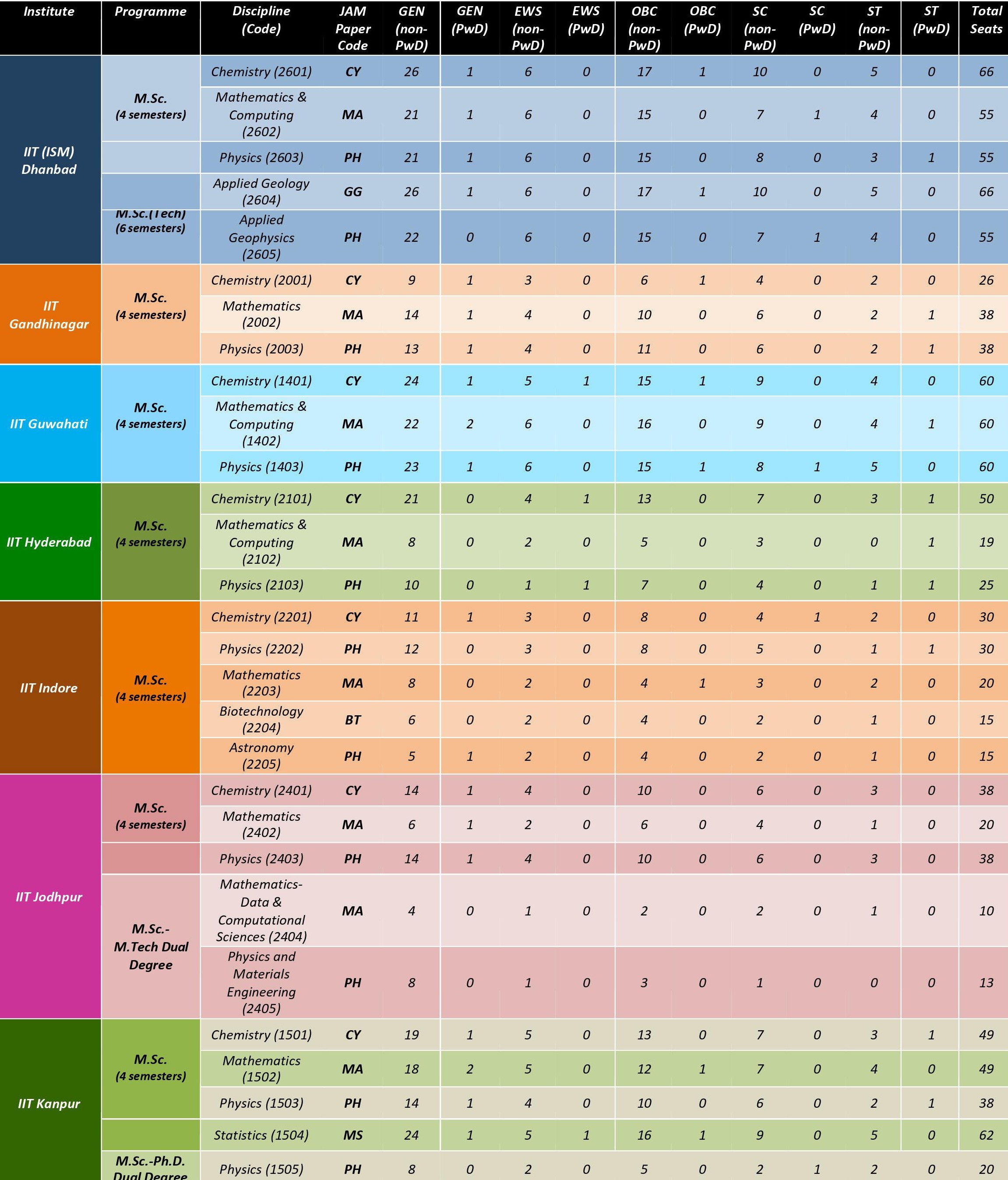
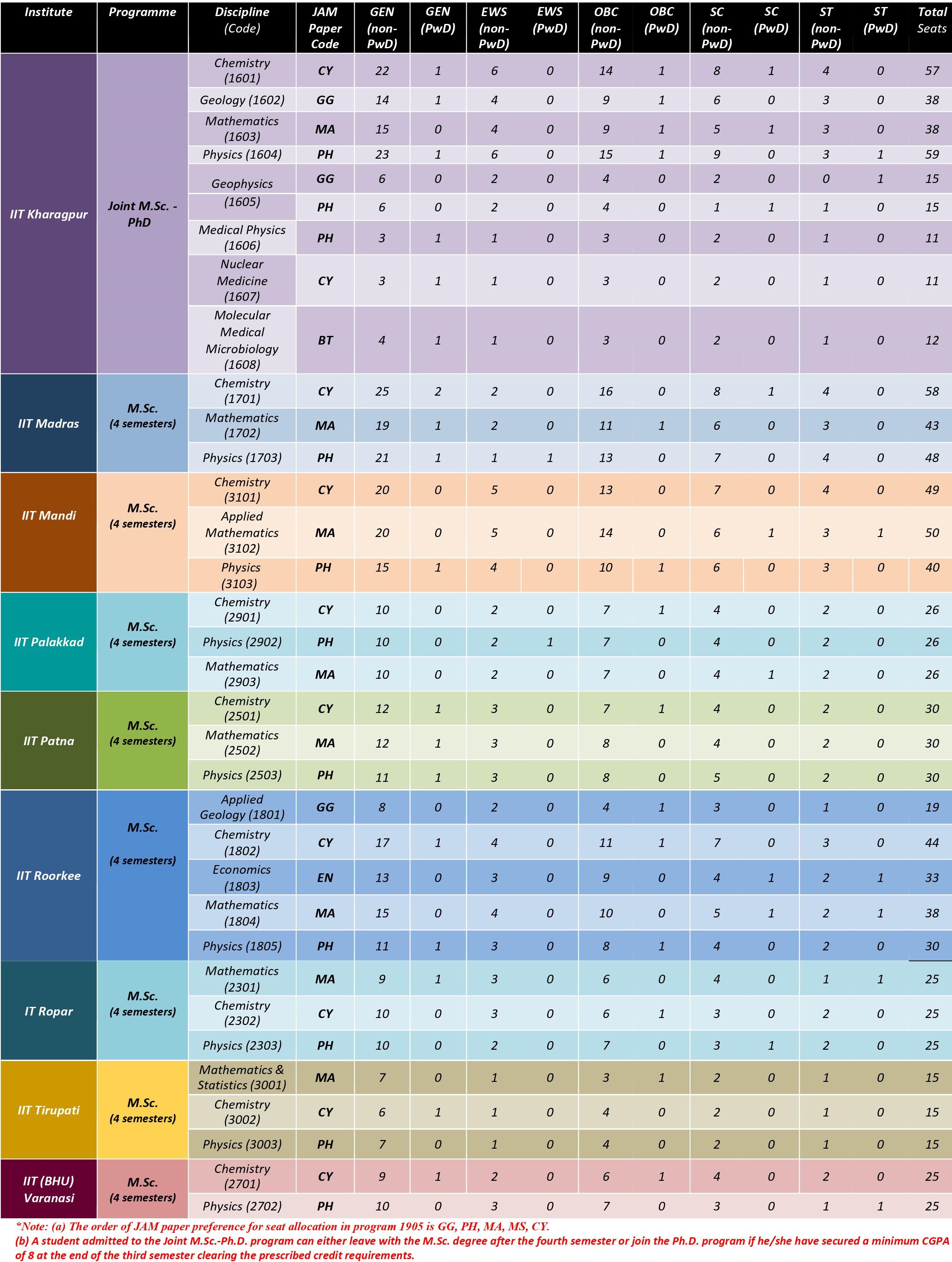
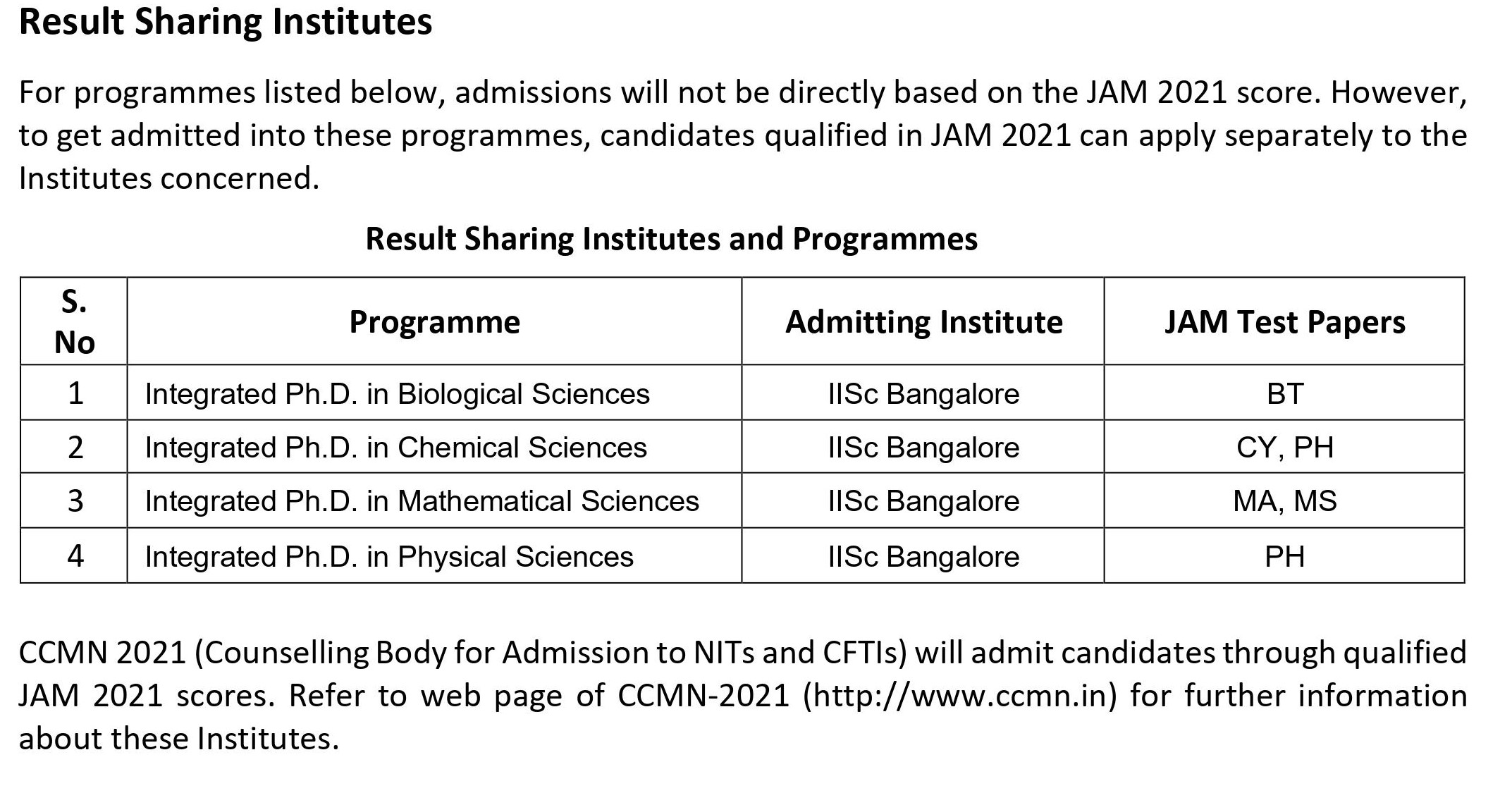
IIT JAM Exam Pattern 2021
IIT JAM 2021 exam is a computer-based online exam that consists of 60 questions of 100 marks. The paper comprises of 3 sections i.e., Section A, B, and C. Students will have to answer all the questions within the time duration of 3 hours. At the time of filling out the application form candidates have to choose the subjects according to the course they have opted for.
- Total No f Questions: 60
- Maximum Marks: 100
- Duration: 3 Hours
SECTION A
- The paper consists of MCQ (Multiple Choice Questions) questions.
- There are a total of 30 questions, 10 of 1 mark and 20 of 2 marks.
- Each correct answer will carry 1 mark from Q1 – Q10, and 2 marks from Q11 – Q30.
- Each wrong answer will consist of 1/3 negative marking for 1 marks question and 2/3 negative marking for 2 marks question.
SECTION B
- The paper consists of MSQs (Multiple Select Questions) questions.
- There are a total of 10 questions.
- There is 1 or more than 1 correct answer for the questions.
- Each correct answer will award a candidate with 2 marks if he/she selects all the correct answer(s).
- No marks shall be deducted for giving an incorrect answer.
SECTION C
- The paper consists of NAT (Numerical Answer Type) questions.
- There are a total of 20 questions, 10 of 1 mark and 10 of 2 marks.
- There is 1 or more than 1 correct answer for the questions.
- Each correct answer will carry 1 mark from Q41 – Q50, and 2 marks from Q51 – Q60.
- No marks shall be deducted for giving an incorrect answer.
| Section | Questions of 1 marks | Questions of 2 marks | Max Marks |
| Section
A MCQ | 10 (Q1-Q10) | 20 (Q11-Q30) | 50 |
| Section
B MSQ | - | 10 (Q31-Q40) | 20 |
| Section
C NAT | 10 (Q41-Q50) | 10 (Q51-Q60) | 30 |
| Total | 20 | 40 | 100 |
IIT JAM Exam Admission Procedure 2021
Eligible candidates, on the basis of the IIT JAM Exam 2021 score, can apply for admission in M.Sc programs provided by different IITs across India.
The All India merit list will be prepared based on the scores of the candidates in the IIT JAM 2021 exam conducting by one of the IITs on a rolling basis. Based on the merit list, seat allotment takes place. After this, candidates can report to the institution for acknowledging the admission.
For admission, candidates have to fit the eligibility criteria issued by the exam conducting authority of the JAM Exam. Now, they have to fill the application form for JAM 2021 through online mode.
Step 1: IIT JAM 2021 Exam
Candidates will have to appear and pass the IIT JAM 2021 exam to get the admission to the M.Sc programs.
Step 2: Shortlisting
A merit list will be prepared based on the marks obtained by the candidates in the IIT JAM 2021 entrance exam, after which candidates have to check the list, so they can fill the admission form for IIT. If the names/roll numbers of the candidate appear in the merit list he/she is eligible for taking the admission.
Step 3: Fill Admission Form for Counselling
All the candidates having their names/roll numbers in the merit list, further you have to fill the admission form for the counseling round. After this candidates have to pay the processing fee of 600 INR through JOAPS.
Step 4: Release of Admission List
The final list of selected candidates will be released after the submission of the admission form and processing fee. After this, offer letters will be sent to the selected candidates by the institute. After this, candidates need to submit an acceptance form along with a fee for advance seat booking through JOAPS.
| category | Fee |
| General/OBC-NCL/EWS | 10000 INR |
| SC/ST/PwD | 5000 INR |
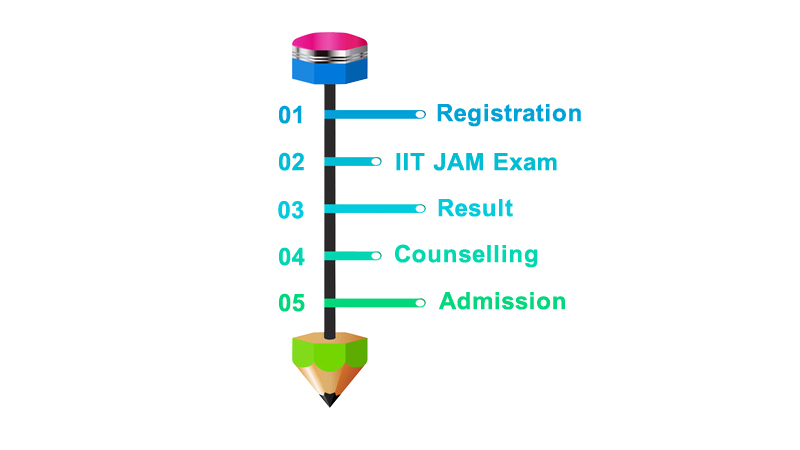
IIT JAM Exam Syllabus 2021
The IIT JAM exam consists of seven subjects based on which students get admitted to the different M.Sc programs offered by the IITs. Tabulated below are the important topics covered by different subjects in the IIT JAM 2021 exam:
IIT JAM Biotechnology (BT) Syllabus
Biology (10+2+3 level)
| Biology | ||
| General Biology | Biochemistry and Physiology | Basic Biotechnology |
| Molecular Biology | Cell Biology | Microbiology |
Chemistry (10+2+3 level)
| SECTIONS | TOPICS |
| Atomic Structure |
|
| Chemistry of Functional Groups |
|
Mathematics (10+2 level)
| Mathematics | ||
| Sets | Relations and Functions | Mathematical Induction |
| Logarithms | Complex numbers | Linear and Quadratic Equations |
| Sequences and Series | Trigonometry | Cartesian System of Rectangular Coordinates |
| Straight lines and Family | Circles | Conic Sections |
| Permutations and Combinations | Binomial Theorem | Exponential and Logarithmic Series |
| Mathematical Logic | Statistics | Three Dimensional Geometry |
| Vectors | Matrices and Determinants | Boolean Algebra |
| Probability | Functions | limits and Continuity |
| Differentiation | Application of Derivatives | Definite and Indefinite Integrals |
| Differential Equations |
Physics (10+2 level)
| Physics | ||
| Physical World and Measurement | Elementary Statics and Dynamics | Kinematics |
| Laws of Motion | Work | Energy and Power |
| Electrostatics | Current electricity | Magnetic Effects of Current and Magnetism |
| Electromagnetic Induction and Alternating Current | Electromagnetic waves | Optics |
| Dual Nature of Matter and Radiations | Atomic Nucleus | Solids and Semiconductor Devices |
| Principles of Communication | Motion of System of Particles and Rigid Body | Gravitation |
| Mechanics of Solids and Fluids | Heat and Thermodynamics | Oscillations |
| Waves |
IIT JAM Chemistry (CY) Syllabus
| SECTIONS | TOPICS |
| Physical Chemistry |
|
| Organic Chemistry |
|
| Inorganic Chemistry |
|
IIT JAM Economics (EN) Syllabus
Microeconomics
| Microeconomics | ||
| Consumer theory | Production, costs with perfectly competitive markets | General equilibrium and welfare |
| Market structure | Game theory | Public goods and market failure |
Macroeconomics
| Macroeconomics | ||
| National Income Accounting | Behavioural and Technological Functions | Business Cycles and Economic Models |
| Business Cycles and Economic Models (Open Economy | Inflation and Unemployment | Growth Models |
Statistics for Economics
- Probability theory, Sample spaces and events, Axioms of probability and their properties, conditional probability and Bayes’ rule, independent events
- Random variables and probability distributions, probability distributions, expected values and functions of random variables, properties of commonly used discrete and continuous distributions
- Random sampling, Density and distribution functions for jointly distributed random variables, computing expected values of jointly distributed random variables, covariance and correlation coefficients
- Point and interval estimation, estimation of population parameters using methods of moments and maximum likelihood procedures, properties of estimators, confidence intervals
- Hypothesis testing, distributions of test statistics, testing hypotheses related to population parameters, Type I and Type II errors, the power of a test, tests for comparing parameters from two samples
Indian Economy
| Indian Economy | ||
| Indian economy before 1950 | Planning and Indian development | Indian economy after 1991 |
| Banking, finance, and macroeconomic policies | Inequalities in social development | Poverty |
| India’s labour market |
Mathematics for Economics
| Mathematics | ||
| Preliminaries and Functions of one real variable | Integration, differential equations, and difference equations | Functions of several real variables |
| Multivariate optimization | Linear programming | Single-variable optimization |
IIT JAM Geology (GG) Syllabus
| Geology (GG) | ||
| The Planet Earth | Geomorphology | Structural Geology |
| Palaeontology | Brachiopoda, Mollusca, Trilobita, Graptolitoidea, Anthozoa, Echinodermata; Gondwana plant fossils; Elementary idea of vertebrate fossils in India. | Stratigraphy |
| Mineralogy | Petrology | Economic Geology |
| Applied Geology |
IIT JAM Mathematics (MA) Syllabus
| Mathematics (MA) | ||
| Sequences and Series of Real Numbers | Functions of One Real Variable | Functions of Two or Three Real Variables |
| Integral Calculus | Differential Equations | Vector Calculus |
| Group Theory | Linear Algebra | Real Analysis |
IIT JAM Mathematical Statistics (MS) Syllabus
Mathematics
| Mathematics | ||
| Sequences and Series | Differential Calculus | Integral Calculus |
| Matrices |
Statistics
| Statistics | ||
| Probability | Random Variables | Standard Distributions |
| Joint Distributions | Sampling Distributions | Limit Theorems |
| Estimation | Testing of Hypotheses |
IIT JAM Physics (PH) Syllabus
| Physics (PH) | ||
| Mathematical Methods | Mechanics and General Properties of Matter | Oscillations, Waves, and Optics |
| Electricity and Magnetism | Kinetic Theory, Thermodynamics | Modern Physics |
| Solid State Physics, Devices and Electronics |
IIT JAM 2021: Participating Institutes and Courses Offered by Them
IIT JAM is the national level postgraduate entrance exam conducted every year by one of the IITs on a rolling basis to provide admission into different M.Sc courses at IITs across India.
Tabulated below are the institutes participating in IIT JAM 2021 with the courses offered by them.
| INSTITUTES | COURSES |
| Indian Institute of Science (IISc), Bangalore |
|
| Indian Institute of Technology (IIT) Bhilai |
|
| Indian Institute of Technology (IIT) Bhubaneswar |
|
| Indian Institute of Technology (IIT) Bombay |
|
| Indian Institute of Technology (IIT) Delhi |
|
| Indian Institute of Technology (IIT) (ISM) Dhanbad |
|
| Indian Institute of Technology (IIT) Gandhinagar |
|
| Indian Institute of Technology (IIT) Guwahati |
|
| Indian Institute of Technology (IIT) Hyderabad |
|
| Indian Institute of Technology (IIT) Indore |
|
| Indian Institute of Technology (IIT) Jodhpur |
|
| Indian Institute of Technology (IIT) Kanpur |
|
| Indian Institute of Technology (IIT) Kharagpur |
|
| Indian Institute of Technology (IIT) Madras |
|
| Indian Institute of Technology (IIT) Mandi |
|
| Indian Institute of Technology (IIT) Palakkad |
|
| Indian Institute of Technology (IIT) Patna |
|
| Indian Institute of Technology (IIT) Roorkee |
|
| Indian Institute of Technology (IIT) Ropar |
|
| Indian Institute of Technology (IIT) Tirupati |
|
| Indian Institute of Technology (IIT) (BHU) Varanasi |
|
IIT JAM Exam 2021: Exam Cities
IIT JAM Exam is conducted in eight zones at different IITs across the nation. Candidates can choose upto 3 cities according to their ease at the time of filling the application form according to their preference. Given below are the zone wise exam centers students can choose from:
| ZONE | CITIES |
| IISc Bangalore |
|
| IIT Bombay |
|
| IIT Delhi |
|
| IIT Guwahati |
|
| IIT Kanpur Zone |
|
| IIT Kharagpur |
|
| IIT Madras |
|
| IIT Roorkee |
|
FAQ Concerning IIT JAM 2021
Q1. Will the test be conducted in Hindi?
A1. The test will be conducted in the English language only.
Q2. What is the IIT JAM exam for?
A2. IIT JAM is a national level exam that is conducted to shortlist students for admission to MSc and integrated MSc courses offered by colleges accepting IIT JAM scores for admission.
Q3. For how many times a candidate can appear for the IIT JAM examination?
A3. One can appear as many times as one wants. There is no restriction on the number of attempts.
Q4. I wanted to do MS in Physics from IITs.
A4. You need to appear for the entrance exam for the same, as above mentioned the detail of the application form for IIT.
Q5. Who is the conducting authority for IIT JAM 2021?
A5. Indian Institute of Science, Bangalore is the conducting authority for IIT JAM 2021.
Best wishes to all the IIT JAM 2021 aspirants from the CollegeMarg Team!










